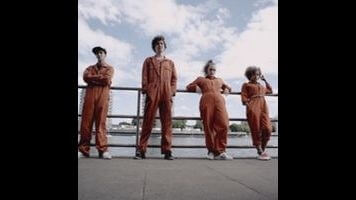Look. There are rules by which TV is supposed to abide. The biggest of them? Major character developments that remove people from a show come at the end of a season. Especially death. That’s the big one. That’s the rule Misfits breaks here.
Of course, there are some exceptions. This is one of Joss Whedon’s not-so-secret dreams, although I’d still suggest that nothing he did was quite so dramatic: one character removed early in the first season for chemistry and chemical issues, but first-season changes are not so rare. Another character removed, but the actor portraying them remained, or a shocking death that was still close to the end of a season. There’s also a Sopranos caveat for characters killed in the known final season—with every episode leading to a finale—and of course some others. But this? Curtis? Now? This is new and shocking in my experience as a television viewer.
That’s a powerful tool in the arsenal of a television producer. I really didn’t expect Curtis to die, for exactly that reason. I wanted to know how the writer/characters would squirm out of his zombification. Only with a few minutes left, when no possible “happy ending” was mentioned, when time was running out, did I believe it possible. And then I realized that it was happening. Misfits was breaking the rules.
The more I think about it, the more the robotic critic portion of my brain likes it. Going with the theory that this is a show about growing up, Curtis is past due. He’s been the first character to mature twice now, first with his power of regret, then dealing with his relationship and self-pity issues with the gender swap. Along the way, he’s been set up as the moral center of the group, and that’s not entirely what Misfits is about.
Relationship-wise, he’s also been in an odd position this season. Misfits has ignored its past storylines. Kelly’s been mentioned, but Simon, Alisha, Superhoodie, and Nathan haven’t. And that’s probably a good thing, because bringing the comparison of what the show used to be, compared to what it is now, is a tremendous distraction. Just the brief shots of Nathan in the season three finale gave me an immediate, visceral reminder of how great he could be, something that can’t help the show in the now. Curtis’ presence tethered the new to the old, and I can’t say it’s that bad of an idea for Misfits to say, simply, “this isn’t about the old characters anymore.” (And, as a side benefit, it puts Rudy in the role of mentor to the new kids, which I’m looking forward to.)
But that robotic critic portion of my brain didn’t have the first reaction. That was “HOLY SHIT THEY KILLED CURTIS!!!” in exactly the way that the episode should have. It worked. After two frustrating season finales and a quickie webisode of saying goodbye to beloved characters, we finally get a good farewell episode. Curtis’ death is surprising but not arbitrary, with plenty of time for us to get used to how it’s going to happen as the episode progresses. I’m glad that the character who’s given us so many of the show’s best hours got the chance to go out in style.
Honestly, even without Curtis’ death, this fourth episode would have been mesmerizing. The formal experiment of the noir story starts it off with a bang. That cold open—with the jukebox, the music, the black and white turning to color, and Lola living the role of femme fatale—is simply stellar. The directing and the editing after that calms down a bit, but remains notable until it switches to zombie style.
But I was also having some serious issues with the noir storytelling, thanks to the gender politics of turning Lola into a kind of succubus. As with the second episode of the season, Misfits did something intellectually understandable in terms of creating character tension, but aesthetically, it bought into some tired sexist tropes. Lola comes across the succubus, playing her men against one another. Yet it wasn’t the excuse that she’d been changed by the storm that made me forgive the hour the way I forgave the episode two weeks ago. It was the scene immediately following, where Curtis, slowly changing into a zombie, confronts Lola. The way he tries to negotiate with her as her pulse pounds ties sex, violence, and the supernatural together in a fascinating way, shifting the theme of the episode away from “deadly women” toward the danger of embracing one’s worst instincts. Lola did—the storm may have made it impossible not to—but Curtis, in that moment, finds the strength to avoid giving into all the passions that got him into this situation no matter how sexual or violent his body was pushing him toward. It’s a powerful way to go out.
Stray observations:
- That opening song is Lana Del Rey? But I liked it. How am I supposed to judge things without hearing them in the future?
- Meanwhile, Rudy! “Knock knock? Who’s there? It’s my cock!”
- “Can’t you just oil the wheels to stop them from squeaking?” Jess barely even has to try to stop Finn’s attempt at Rudy-style pick-ups.
- “Why would he be wearing safety goggles? Is he a scientist?”
- Rudy’s character growth this season leads to this moment: “Shit! Right! That’s why you didn’t want me shouting yer name. Consider me up to speed, dude.” It’s probably funnier this way than the total obliviousness that would have happened in season three.
- “You are a very attractive young man but I’m your probation worker. Some things are just not meant to be. It is a cruel and bitter world.”
- “There ain’t no happy endings. It’s zombie noir innit.” Curtis is genre savvy for a totally new genre. That’s gotta be a new record.


 Keep scrolling for more great stories from A.V. Club.
Keep scrolling for more great stories from A.V. Club.